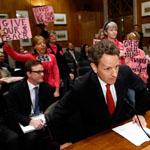
The Obama administration is expected to propose legislation by June calling for the U.S. Federal Reserve to play a central role in regulating systemic risk in the economy, trade association sources said on Friday. Now that the U.S. bank stress tests are over, the administration is refocusing on a drive to tighten regulation of banks and markets to prevent another financial crisis like the one that is currently ravaging economies worldwide. Systemic risk refers to problems in the financial system large enough to damage the overall economy. For instance, the government last year bailed out insurer American International Group because its failure was seen as a systemic risk. – Reuters
Dominant Social Theme: The adults move in.
Free-Market Analysis: In a previous analysis we commented on a discussion between American libertarian congressman Ron Paul (R-Tex) and Federal Reserve chairman Ben Bernanke. We focused on the issue of inflation and how the Federal Reserve apparently stood ready to hike interest rates high enough to make the middle class shout. Bernanke was expressionless as he explained to Ron Paul (as if he did not know) that was how "monetary policy" works. But the main point of the discussion Paul had initiated was actually how central banking inevitably concentrates power over time in the hands of quasi-governmental institutions, thus leading inevitably to increased socialism.
That's indeed what's happening isn't it? Apparently the Obama administration is posed to give the Fed increased powers to regulate what is being called "systemic risk." The idea is that the Fed will step in to mitigate exposure when those charged with appraising systemic risk believe that the market itself is becoming over-leveraged. And alarmingly enough, the debate is not whether this will take place so much as how it will occur and who will be involved.
Treasury Secretary Timothy Geithner is open to the possibility of a council to coordinate among bank regulators, including the agency overseeing the stability of the system as a whole, the spokesman told Reuters on Friday. "Secretary Geithner believes that we need a single independent regulator with responsibility for systemically important firms and critical payment and settlement systems," spokesman Andrew Williams said. "He does see a role, however, for a council to coordinate among the various regulators, including the systemic risk regulator," Williams added.
It is inevitable that such a system will do for professional finance what the graduated taxation did for private finance – demand regular exposure of every last jot and tittle of hitherto private information. There is no way, from what we can tell, that the system being discussed can be implemented without entities – across the board – making their trading records transparent. Proprietary trading techniques, private positions, investment strategies and every other conceivable kind of closely-held approach to financial markets will be made available to regulatory authorities. The invasiveness of what is seemingly being planned is astonishing.
Now maybe we're wrong. Perhaps whatever structure that is being worked out – and apparently the Fed is the entity that will receive the most power in this regard – will not need to collect specifics, or not too many of them. We'll have to wait and see. But we don't quite understand how any entity or group of entities can monitor systemic risk without knowing the actual positioning of players large and small. And that means a daily, hourly or tick-by-tick presentation of information to those who need to make judgments about the systems solvency.
It's not of course just in America that such a system will have to be established. Europe and other trading regions would have to set up systems similar to that which are set up in the West. Much as the world has followed the example of America in setting up SEC-like regulatory agencies, so no doubt the world will follow the trail blazed in the United States when it comes to systemic risk.
Look … remind us what part of the Western regulatory structure worked as planned during the latest economic crisis. The various regulatory agencies stood by — didn't they? — while markets melted down in America and abroad. The idea that some exponential expansion of regulatory power (by a quasi-private entity in the case of the Fed) can mitigate what has just taken place is highly questionable. What is far less questionable is its invasiveness. How can it not provide an impetus to set up the most massive dragnet of private information since the establishment of the income tax?
We have a hard time believing this all will work as planned. The idea that central banks are to be empowered to monitor systemic risk is especially ironic given that central banks create the instability in the first place by over-printing money. What this sort of massive regulatory structure will create, were it to implemented fully, would be massively homogenized capital flows. Thus, central banks will be in the position not only to create money but to designate, basically where and how these funds are traded. Sort of a cradle-to-grave control of the monetary instrument.

Given that no one at the Fed, or anywhere else for that matter (with the exception of a handful of brave, free-market economists), anticipated the latest financial meltdown, one shudders to think of misjudgments that will be made over time and the terrible ramifications of this sort of command-and-control of trillions in money flows. It would no doubt result in a 100,000 Dow and then a depression that would ravage the world. But even its implementation may generate a substantial flight to quality. Gold is currently hovering under US$1,000 but we can hardly imagine where it goes as discussions about these invasive systems mature and are seen as feasible.
